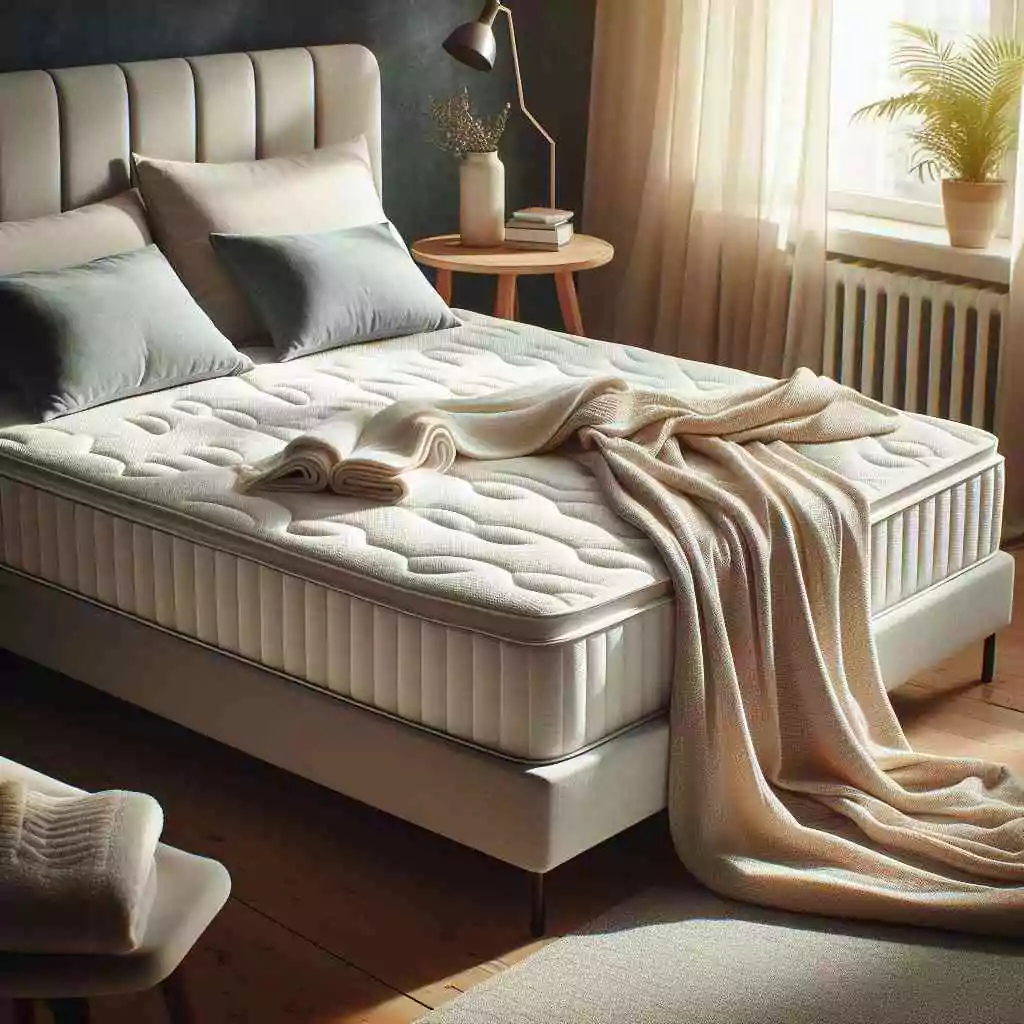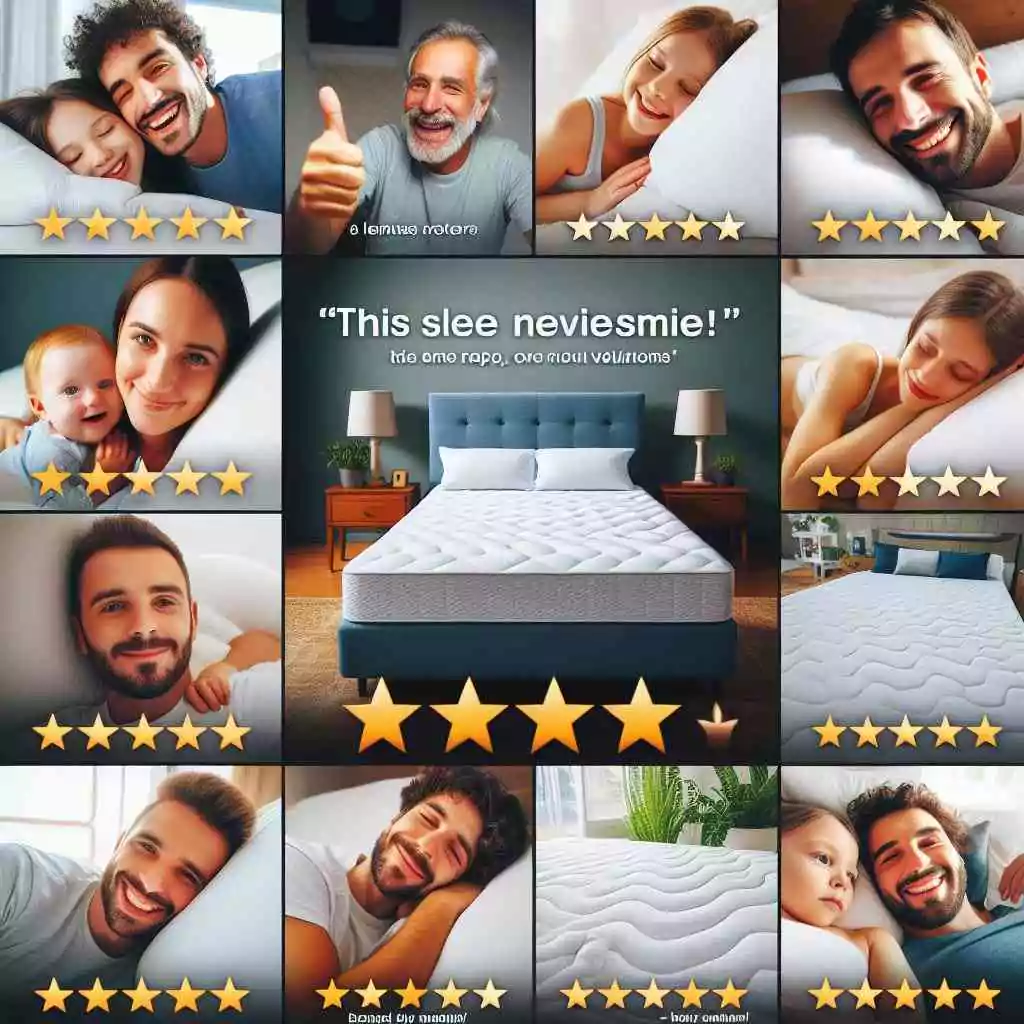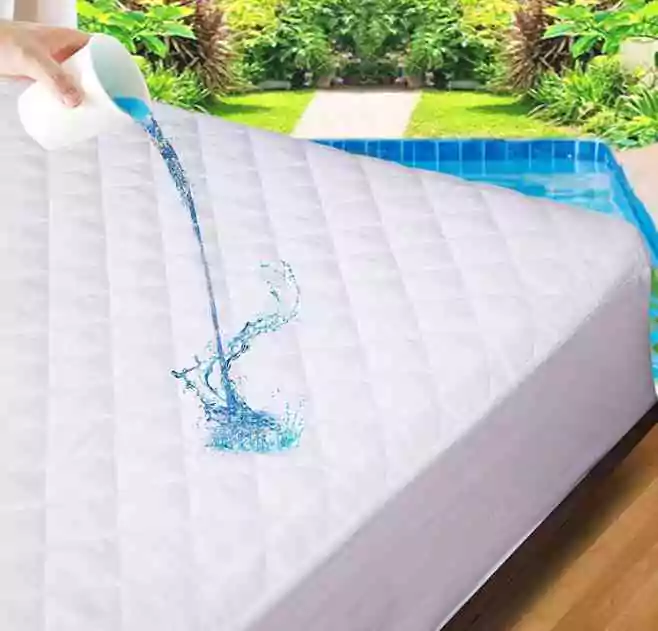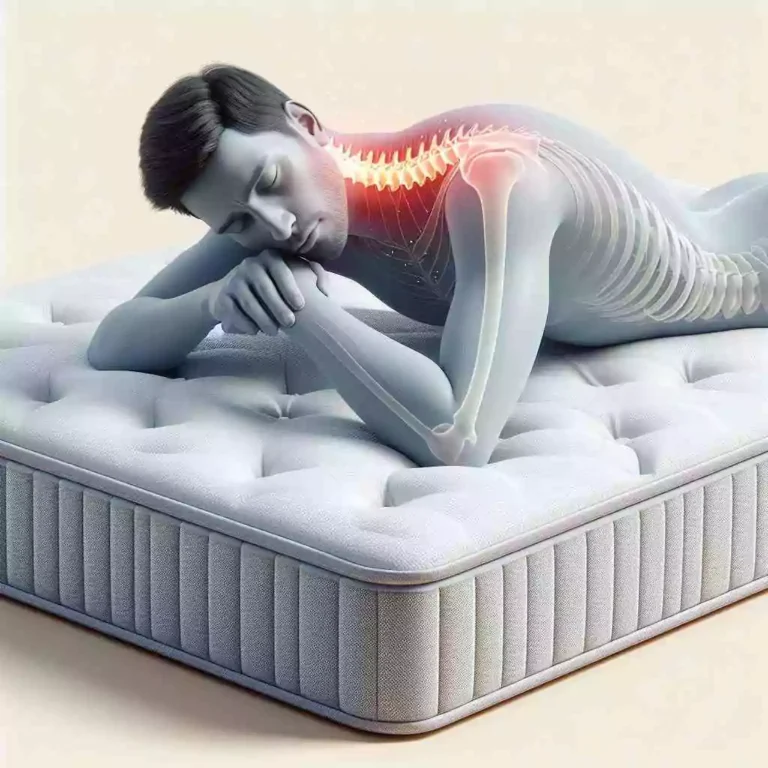Have you ever spilled coffee on your bed and watched in horror as it seeped into your memory foam mattress? Or have you ever woken up feeling sweaty and sticky because your memory foam mattress trapped too much heat? If you answered yes to any of these questions, you know the importance of having a quality mattress protector for your memory foam mattress.
A mattress protector is a thin layer of fabric that protects your mattress from stains, spills, dust mites, allergens, and other potential damages. A memory foam mattress protector is designed to fit and complement your memory foam mattress. It is made of a viscoelastic material that conforms to your body shape and provides pressure relief and comfort.
In this blog post, we will help you find the best mattress protector for memory foam by explaining what memory foam mattress protectors are, why you need them, what factors to consider when choosing them, and our top picks based on our research and analysis. Whether you are looking for a waterproof, breathable, or hypoallergenic mattress protector, we have you covered. Read on to discover the best mattress protector for memory foam and how to care for it.
Table of Contents
Understanding Memory Foam Mattress Protectors

Memory foam mattress protectors are not the same as mattress pads or toppers, which are thicker and add extra cushioning or support to your mattress. Mattress protectors are thinner and serve as a barrier between your mattress and your sheets, preventing any liquids or particles from reaching your mattress.
Memory foam mattress protectors have several benefits, such as:
- By preventing wear and tear, sagging, and yellowing, you are extending the lifespan of your memory foam mattress.
- We are preserving the warranty of your memory foam mattress by keeping it clean and undamaged.
- Enhancing the comfort and hygiene of your sleep environment by reducing the accumulation of dust mites, bacteria, mold, and odors.
- Regulating the temperature and moisture of your memory foam mattress by allowing air circulation and wicking away sweat.
- Protecting your health and well-being by preventing allergic reactions, skin irritations, and respiratory problems caused by exposure to allergens and contaminants.
Memory foam mattress protectors can greatly improve sleep quality and satisfaction. For example, if you suffer from night sweats or hot flashes, a breathable and cooling mattress protector can help you sleep more comfortably and peacefully. Similarly, if you have pets or kids who like to jump on your bed, a waterproof and durable mattress protector can save you from the hassle and cost of cleaning or replacing your memory foam mattress.
Factors to Consider When Choosing a Mattress Protector
Not all memory foam mattress protectors are created equal. There are many factors to consider when choosing the best mattress protector for memory foam, such as:
- Material: The material of the mattress protector affects its feel, durability, and performance. Some common materials are cotton, polyester, bamboo, and tencel. Cotton is soft, breathable, and natural, but it may not be waterproof or resistant to stains. Polyester is cheap, durable, and easy to clean but may not be breathable or eco-friendly. Bamboo is soft, breathable, and antibacterial but may be more expensive and prone to shrinking. Tencel is soft, breathable, and moisture-wicking, but it may be more delicate and require special care.

- Waterproofing: The waterproofing of the mattress protector determines its ability to prevent liquids from penetrating your memory foam mattress. Some mattress protectors have a waterproof membrane or coating, such as polyurethane, vinyl, or TPU, that prevents fluids from reaching your mattress. Others have a water-resistant fabric that repels liquids but may be partially waterproof. Waterproof mattress protectors are ideal for people who spill drinks or sweat, have pets, or have kids who may wet the bed. However, some waterproof mattress protectors may make noise, trap heat, or reduce breathability.
- Breathability: The mattress protector’s breathability affects its temperature regulation and moisture management. Some protectors have breathable fabric or mesh that allows air to flow through and dissipate heat and moisture. Others have cooling technology, such as gel-infused fibers, phase change materials, or copper, that absorbs and releases heat to keep you cool and comfortable. Breathable and cooling mattress protectors are ideal for people who sleep hot, live in warm climates, or have memory foam mattresses that tend to retain heat.
- Fit: The fit of the mattress protector determines how well it covers and secures your memory foam mattress. Some mattress protectors have a fitted sheet style with elastic corners that wrap around your mattress. Others have a zippered or encasement style, with a zipper enclosing your entire mattress. Fitted sheet mattress protectors are easy to put on and take off, but they may not protect the sides or bottom of your mattress. Zippered or encasement mattress protectors are more secure and protective but may be more difficult to remove and wash.
When choosing the best mattress protector for memory foam, consider your personal preferences, needs, and budget. Read the product description, reviews, and ratings to get a better idea of the mattress protector’s quality and performance. Compare different options and features to find the best value for your money.
Our Top Picks for Memory Foam Mattress Protectors
Based on our research and analysis, we have selected three top picks for memory foam mattress protectors that offer excellent protection, comfort, and durability. Here they are:

Memory Foam Mattress Protector A
Our first top pick is the SafeRest Premium Hypoallergenic Waterproof Mattress Protector. This mattress protector is made of soft and breathable cotton terry fabric that is noiseless and comfortable. Its waterproof membrane blocks fluids, dust mites, allergens, and bacteria from reaching your memory foam mattress. It also has a fitted sheet style that fits mattresses up to 18 inches deep.
Some of the pros and cons of this mattress protector are:
- Pros:
- It is hypoallergenic and safe for people with allergies or sensitive skin.
- It is easy to clean and machine washable.
- A 10-year warranty and a money-back guarantee back it.
- Cons:
- It may need to be more relaxed or more breathable for some people.
- It may shrink or lose its waterproofing after repeated washing.
- It may need to fit more snugly or securely on some mattresses.
Memory Foam Mattress Protector B
Our second top pick is the PlushDeluxe Premium Bamboo Mattress Protector. This mattress protector is made of ultra-soft and silky bamboo fabric that is breathable and antibacterial. It has a waterproof coating that prevents liquids, stains, odors, and mold from damaging your memory foam mattress. It also has a fitted sheet style that fits mattresses up to 18 inches deep.
Some of the pros and cons of this mattress protector are:

- Pros:
- It is eco-friendly and biodegradable.
- It is cooling and moisture-wicking for hot sleepers.
- It is durable and resistant to tearing or pilling.
- Cons:
- It may be more expensive than other options.
- It may require special care and gentle washing.
- It may not be very effective against dust mites or allergens.
Memory Foam Mattress Protector C
Our third top pick is the Luna Premium Hypoallergenic Zippered Bed Bug Proof Mattress Encasement. This mattress protector is made of soft, noiseless, and cozy polyester fabric. Its waterproof and bed bug-proof zipper seals your memory foam mattress from all sides. It also has breathable and cooling technology that regulates body temperature and enhances sleep quality.
Some of the pros and cons of this mattress protector are:
- Pros:
- It is hypoallergenic and protects against bed bugs, dust mites, allergens, and bacteria.
- It is easy to install and remove with a 3-sided zipper.
- A 15-year warranty and a money-back guarantee back it.
- Cons:
- It may be more challenging to wash and dry than other options.
- It may trap some heat or moisture for some people.
- It may need to fit better on some mattresses.
How to Care for Your Memory Foam Mattress Protector
Once you have chosen and purchased the best mattress protector for memory foam, you must take good care of it to ensure its longevity and effectiveness. Here are some tips on how to care for your memory foam mattress protector:

- Follow the manufacturer’s instructions on how to wash and dry your mattress protector. Generally, you should clean it in cold or warm water with mild detergent and tumble dry on low heat or air dry. Avoid using bleach, fabric softener, or ironing, as they may damage the fabric or the waterproofing.
- Wash your mattress protector at least once every two months or more frequently if you spill something, sweat a lot, or have pets or kids who may soil it. If needed, spot-clean it with a damp cloth and mild soap.
- Rotate and flip your memory foam mattress every six months to prevent sagging and uneven wear. You can also vacuum your mattress occasionally to remove dust and debris.
- Keep your mattress protector away from sharp objects, heat sources, or direct sunlight, as they may cause tears, holes, or fading.

Conclusion
A memory foam mattress protector is a worthwhile investment that can protect your mattress from stains, spills, dust mites, allergens, and other damages. It can also enhance your comfort and hygiene by regulating the temperature and moisture of your mattress and preventing allergic reactions, skin irritations, and respiratory problems.
In this blog post, we have helped you find the best mattress protector for memory foam by explaining what memory foam mattress protectors are, why you need them, what factors to consider when choosing them, and our top picks based on our research and analysis. We have also provided some tips on caring for your memory foam mattress protector and prolonging its lifespan and effectiveness.
We hope you have found this blog post informative and helpful. Suppose you are interested in buying a memory foam mattress protector. In that case, we encourage you to check out our recommended products and see how they can improve your sleep quality and satisfaction. You can also share your experiences with memory foam mattress protectors in the comments section below. We would love to hear from you. Thank you for reading, and happy sleeping!
FAQ
Is it OK to put a mattress protector on a memory foam mattress?
Yes, it is OK to put a mattress protector on a memory foam mattress. In fact, it is recommended to do so, as it can protect your mattress from stains, spills, dust mites, allergens, and other damages. A mattress protector can also enhance your comfort and hygiene by regulating the temperature and moisture of your memory foam mattress and preventing allergic reactions, skin irritations, and respiratory problems. Just make sure you choose a high-quality mattress protector that is breathable and waterproof and fits your mattress well.
Should you put a mattress topper on a memory foam mattress?
It depends on your personal preference and needs. A mattress topper is a thick layer of material that goes over your mattress, adding extra cushioning or support. Some people may put a mattress topper on a memory foam mattress to adjust the firmness, softness, or feel of their mattress. Others may not need a mattress topper, as they are satisfied with the comfort and support of their memory foam mattress. If you decide to use a mattress topper, you should also use a mattress protector to protect both your mattress and your topper.
What not to do with memory foam mattress?
There are some things you should avoid doing with your memory foam mattress, such as:
Jumping or standing on your memory foam mattress, as it can damage the foam and reduce its lifespan.
Exposing your memory foam mattress to direct sunlight, as it can cause fading and damage.
Using harsh chemicals or cleaning products on your memory foam mattress, as they can harm the fabric or the foam.
Keeping your memory foam mattress in a humid or poorly ventilated room, as it can cause moisture buildup and mold growth.
Can you use a regular mattress pad on a memory foam mattress?
Yes, you can use a regular mattress pad on a memory foam mattress, as long as it is compatible with your mattress size and depth. A mattress pad is a thin layer of material that goes over your mattress, providing some extra comfort and protection. However, a regular mattress pad may not be as effective as a memory foam mattress pad, which is specially designed to fit and complement your memory foam mattress. A memory foam mattress pad can conform to your body shape, provide pressure relief and comfort, and regulate the temperature and moisture of your memory foam mattress.




Can you be more specific about the content of your article? After reading it, I still have some doubts. Hope you can help me. https://www.binance.com/da-DK/register?ref=V2H9AFPY